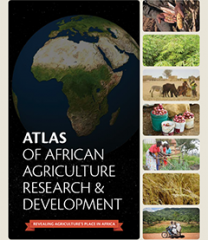Although Africa possesses nearly half of the world’s uncultivated arable land area, the prospect of expanding agricultural production into these zones carries significant environmental risks and is not viewed by many experts as a viable solution to the region’s myriad food security challenges. Rather, increasing agricultural productivity on areas already in production- otherwise known as agricultural intensification- may hold the key to increasing food supplies sustainably, particularly among smallholder farmers who work on an estimated 62% of Africa’s farmland area currently under cultivation.
The Atlas of African Agriculture Research & Development, a new IFPRI publication, gives African farmers and those working to serve them insights and resources to help boost agricultural production without degrading the region’s natural resources for future use.
A series of maps covering more than 30 topics organized around seven themes, the Atlas tells a story about the state of agriculture in Africa. The Atlas explains in depth the value behind each map, why it is important, and what can be learned from it. The result is a story, illustrated through a wide range of geospatial data, about the diverse challenges African farmers face, as well as opportunities for boosting productivity.
The obstacles illustrated in the maps include problems of land quality, climate, and economics:
- Years of weathering have degraded many soils in Africa south of the Sahara (SSA), removing nutrients, increasing acidity, and limiting farmers’ yields. Consequently, approximately 80 percent of SSA’s cropland is not considered very suitable for agriculture.
- Changes in climate between now and 2050 are predicted to shorten growing periods in Africa significantly, impacting crop and livestock productivity. Climate change-related temperature increases and rainfall variations—on a continent where most agriculture is rainfed—could push some of these areas to a point where cropping may fail in most years.
- Trade in agricultural products is constrained by agricultural policies, poor transportation networks, and long distances to market. Poor market access can also limit farmers’ ability to obtain critical agricultural inputs such as fertilizer, pesticides, and seed.
However, the Atlas also describes opportunities to meet these, and other, challenges:
- Intensifying cropping, or growing the same crops several times a year, can increase production, help farmers adapt to growing demand for food, and overcome shortages in cultivatable land.
- Increasing yields for root crop staples like cassava and sweet potato can provide another opportunity. These roots are “insurance crops” that increase food security because they can be left in the ground until needed.
- Understanding agricultural climate zones can help scientists, governments, and businesses determine the best areas to boost production or focus investment, streamlining technology adoption and encouraging innovative approaches.
- Improving infrastructure and making markets more accessible is crucial for poor farmers to remain economically self-sufficient and maintain their food security. This includes maritime ports, through which more than 90 percent of international traded in African countries is conducted.
The Atlas of African Agriculture Research & Development is a resource committed to strengthening smallholder agriculture in Africa. As IFPRI Director General Shenggen Fan notes, it is driven by a belief that “a better understanding of … agricultural research and development in Africa can contribute to better targeted policy and investment decisions and — to better livelihoods for the rural poor.”
With contributions from Marcia MacNeil.







